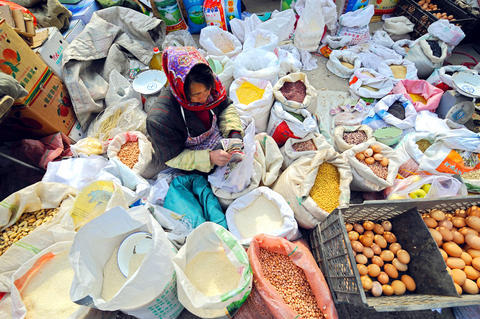The World Bank cut its economic growth forecast for China this year to 9.6 percent from 10.8 percent yesterday because of cooling global export demand and said storms battering southern China should have little long-term impact.
Growth should be buoyed by expected strong demand from China's own consumers, though a possible US slowdown might hurt the country's large export sector, the bank said in a quarterly report.
Economists have slashed forecasts for China's fast-growing economy amid worries that a US recession could cut US imports from China and hurt other Chinese markets such as Europe and Japan.

PHOTO: AFP
"The world economy is going to be weaker and this will have an impact on China," said Louis Kuijs, a bank economist who was the report's chief author.
Still, "China is in a relatively strong position," he said.
Growth of 9.6 percent was "still robust," Kuijs said.
Snowstorms that have wrecked crops and disrupted trains and trucking in southern China would hurt industrial output and push up prices of vegetables and other perishable goods, but there should be little long-term effect, the bank said. The government has reported storm damage so far at 53.8 billion yuan (US$7.5 billion).
"There is no doubt it is going to affect industrial production and economic activity in the short term," Kuijs said. "We do think, though, that most of this impact is going to be temporary."
The slowdown in global demand would hurt China's manufacturers and exporters, Kuijs said. The government said exports rose 25.7 percent last year to US$1.2 trillion.
But Chinese consumer spending and corporate profits are "still strong" and Beijing is moving ahead with investment plans that should help to shore up growth, Kuijs said.
The bank warned that China still faces potential problems as it tries to manage rapid growth, control a surge in inflation and cope with a flood of export revenues that are straining the central bank's ability to contain pressure for prices to rise.
Inflation so far is limited to food, but if it continues, "the risk remains that it will be fed through into general inflation," Kuijs said.
The central bank has raised interest rates repeatedly over the past year and Kuijs said regulators were right to focus on such a "relatively tight" monetary stance.
Beijing has responded to the surge in food costs by imposing price controls and trying to increase supplies by boosting subsidies to pig farmers and curbing grain exports.
David Dollar, director of the World Bank's Beijing office, said such controls could help in the short run. But he echoed warnings by other economists who say they could hurt the economy by eliminating incentives to expand output.
If pork or grain prices are set below what it costs farmers to produce them, "then you are discouraging production of exactly what is in short supply," he said.

The combined effect of the monsoon, the outer rim of Typhoon Fengshen and a low-pressure system is expected to bring significant rainfall this week to various parts of the nation, the Central Weather Administration (CWA) said. The heaviest rain is expected to occur today and tomorrow, with torrential rain expected in Keelung’s north coast, Yilan and the mountainous regions of Taipei and New Taipei City, the CWA said. Rivers could rise rapidly, and residents should stay away from riverbanks and avoid going to the mountains or engaging in water activities, it said. Scattered showers are expected today in central and

People can preregister to receive their NT$10,000 (US$325) cash distributed from the central government on Nov. 5 after President William Lai (賴清德) yesterday signed the Special Budget for Strengthening Economic, Social and National Security Resilience, the Executive Yuan told a news conference last night. The special budget, passed by the Legislative Yuan on Friday last week with a cash handout budget of NT$236 billion, was officially submitted to the Executive Yuan and the Presidential Office yesterday afternoon. People can register through the official Web site at https://10000.gov.tw to have the funds deposited into their bank accounts, withdraw the funds at automated teller

COOPERATION: Taiwan is aligning closely with US strategic objectives on various matters, including China’s rare earths restrictions, the Ministry of Foreign Affairs said Taiwan could deal with China’s tightened export controls on rare earth metals by turning to “urban mining,” a researcher said yesterday. Rare earth metals, which are used in semiconductors and other electronic components, could be recovered from industrial or electronic waste to reduce reliance on imports, National Cheng Kung University Department of Resources Engineering professor Lee Cheng-han (李政翰) said. Despite their name, rare earth elements are not actually rare — their abundance in the Earth’s crust is relatively high, but they are dispersed, making extraction and refining energy-intensive and environmentally damaging, he said, adding that many countries have opted to

CONCESSION: A Shin Kong official said that the firm was ‘willing to contribute’ to the nation, as the move would enable Nvidia Crop to build its headquarters in Taiwan Shin Kong Life Insurance Co (新光人壽) yesterday said it would relinquish land-use rights, or known as surface rights, for two plots in Taipei’s Beitou District (北投), paving the way for Nvidia Corp to expand its office footprint in Taiwan. The insurer said it made the decision “in the interest of the nation’s greater good” and would not seek compensation from taxpayers for potential future losses, calling the move a gesture to resolve a months-long impasse among the insurer, the Taipei City Government and the US chip giant. “The decision was made on the condition that the Taipei City Government reimburses the related